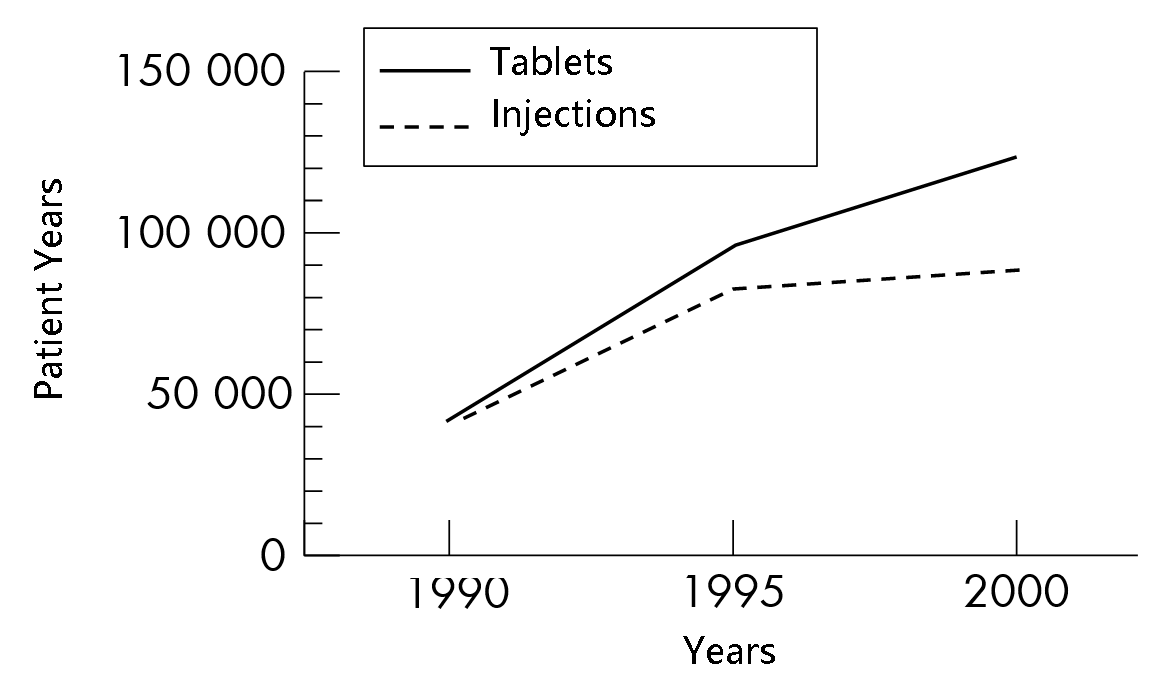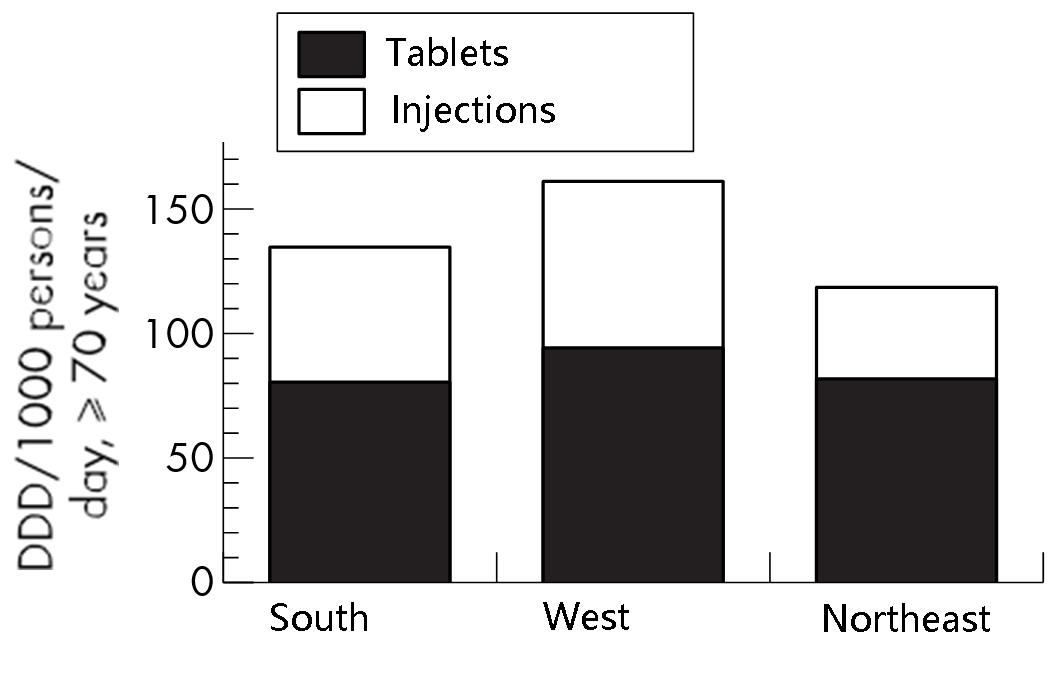B12 tablets vs. injections
Since 1964 internists in Sweden have had the choice to treat a vitamin B12 deficiency with tablets or injections. Over the years more confidence has been gained in the use of vitamin B12 tablets to resolve a vitamin B12 deficiency.
Since 1990 there has been a slight preference for treating vitamin B12 deficiency with tablets, as can be seen in the figure below.

Figure 1: Vitamin B12-treatment in Sweden in patient-years (1 patient year is equal to 50 injections or 360 tablets). This research includes all ages. Source: Swedish Pharmaceutical Data 1
Notable in Figure 1 is that the number of patients who are being treated for a vitamin B12 deficiency almost tripled from 1990 to 2000 (expressed in patient years). It is assumed this is caused by the introduction of Homocysteine test and Methylmalonic acid (MMA-test) in order to determine a vitamin B12-deficiency.
Statement Vitamin B12 deficiency may be treated with oral high dose vitamin B12 (tablets) as effectively as with injections of vitamin B12.
This statement is not only confirmed in Sweden, in 1998 it was confirmed for American conditions and in 2003 by clinicians in Engeland and France . 1 3 4 5
In 2014, in the Netherlands, the NHG (The Dutch College of General Practitioners) had stated that a vitamin B12-deficiency can be treated by either injections or tablets.2
The Swedish study has been conducted among all ages and includes 1,000,000 patient years of oral high dose vitamin B12 therapy between 1990 and 2000 which is compared to 750,000 patient years of vitamin B12 injections. The choice between tablets and injections has been approved, monitored and evaluated by about 10,000 Swedish general practitioners, each with their individual bias.
We recommend reading the concerning article: 1 1 Medical intelligence in Sweden. Vitamin B12: oral compared with parenteral?
2 out of 3 patients above 70 years old were treated with vitamin B12-tablets (in the year 2000).

Figure 2: Total amount of vitaminB12 prescriptions given to residents over 70 years old in Sweden, divided by area.
(DDD = defined daily dose) Source: Apoteket AB.
In Sweden, neurologists and psychiatrists prefer injections. Most patients prefer tablets. 1
Treatment of a vitamin B12 deficiency with tablets is even referred to "Medicine's best-kept secret" by a scientific article released in 1991.6 This is because tablets resolve the drawbacks of injections (which can be painful and difficult to provide for elderly patients who cannot leave the house).7
Please note: Injections do help a lot of people. It is not our intention to be negative towards injections. The intention of this article is to show that there has been extensive research for years on oral supplementation of vitamin B12 and that it is an alternative to injections. When suffering from serious disorders or complaints, please visit your general practitioner or a health professional.
Folic acid/folate
It is always indicated to combine vitamin B12 supplementation with folic acid/folate. 3 8
These vitamins are linked to each other in the methyonine-cyclus; a deficiency of folic acid/folate will therefore inhibit the function of vitaminB12 and vice versa. 3 8 9 10 11 12
Also see literature folate.
Conclusion
The findings suggest that many patients in other post-industrial societies may also be suitable for oral vitamin B12 treatment.
Folate (5-MTHF)
Literature about active folic acid: Folate (5-MTHF))
Medication
Overview of medication known to interfere with the absorption of vitamin B12.
List of symptoms
The most comprehensive comprehensive list of symptoms! caused by a vitamin B12 deficiency.
Source:
1 M Nilsson, B Norberg, J Hultdin, H Sandström, G Westman, J Lökk Medical intelligence in Sweden. Vitamin B12: oral compared with parenteral? http://pmj.bmj.com/content/81/953/191.full [PDF]
2 NHG-Standpunt Diagnostiek van vitamine-B12-deficiëntie 2014 [PDF]
3 Kuzminsky AM, Del Giacco EJ, Allen RH, et al. Effective treatment ofcobalamin deficiency with oral cobalamin. Blood 1998;92:1191–8.
4 Nyholm E, Turpin P, Swain D, et al. Oral vitamin B12 can change ourpractice. Postgrad Med J 2003;79:218–20.
5 Andre´s E, Perrin A-E, Demangeat C, et al. The syndrome of food-cobalaminmalabsorption revisited in a department of internal medicine. A monocentric cohort study of 80 patients. Eur J Intern Med 2003;14:221–6.
6 Oral Cobalamin for Pernicious Anemia Medicines Best Kept Secret 1991
7 Middleton J, Wells W. Vitamin B12 injections: considerable source ofwork for the district nurse. BMJ. 1985;290:1254-1255.
8 Lökk J, Nilsson M, Norberg B, et al. Controversies around vitamin B12 in Sweden. Attitudes and values behind clinical decision-making in primary health care 1996. Hematology 1997;2:341–50
9 Lökk J, Nilsson M, Norberg B, et al. Shifts in B12 opinions in primary health care of Sweden. Scand J Public Health 2001;29:122–8.
10 Lökk J, Nilsson M, Norberg B, et al. Vitamin B12 in primary health care and geriatrics. Attitudes, knowledge, competence. Int J Geriatr Psychiatry 2001;17:987–92
11 Nilsson M, Lökk J, Norberg B, et al. Sex differences in cobalamin (vitamin B12) opinions of Swedish physicians. Nord J Psychiatry 2002;56:299–303
12 Björkegren K. Studies on vitamin B12 and folate deficiency markers in the elderly. A population-based study (Dissertation). Uppsala: Uppsala University, 2003
- Contact
- Terms and Conditions
- Sitemap
- Privacy policy
- Disclaimer
- © VitaminB12first 2025

